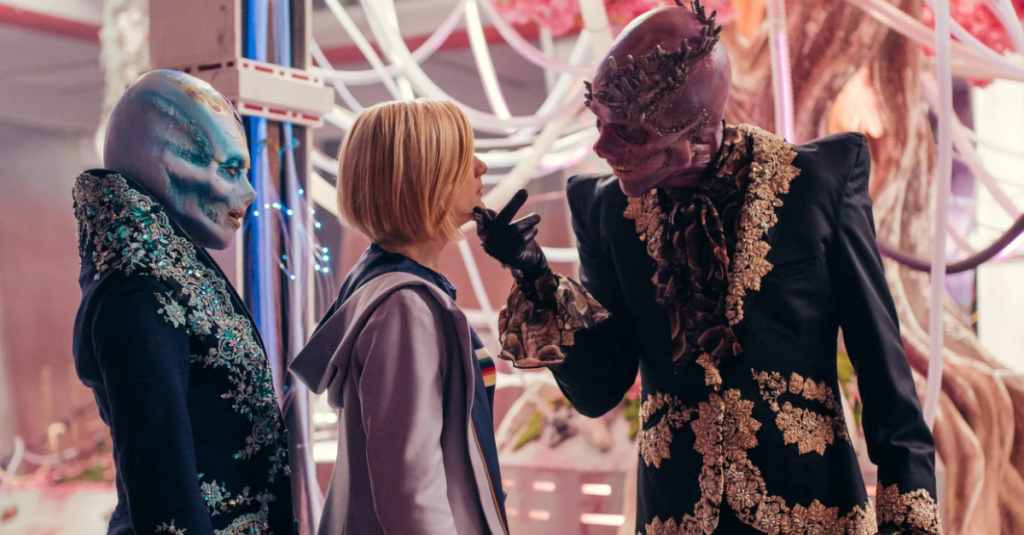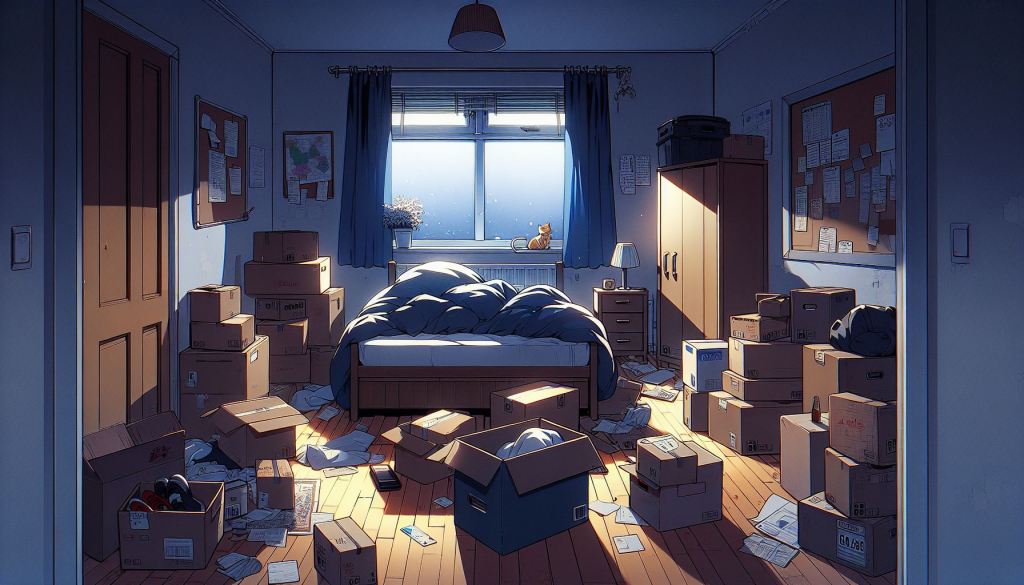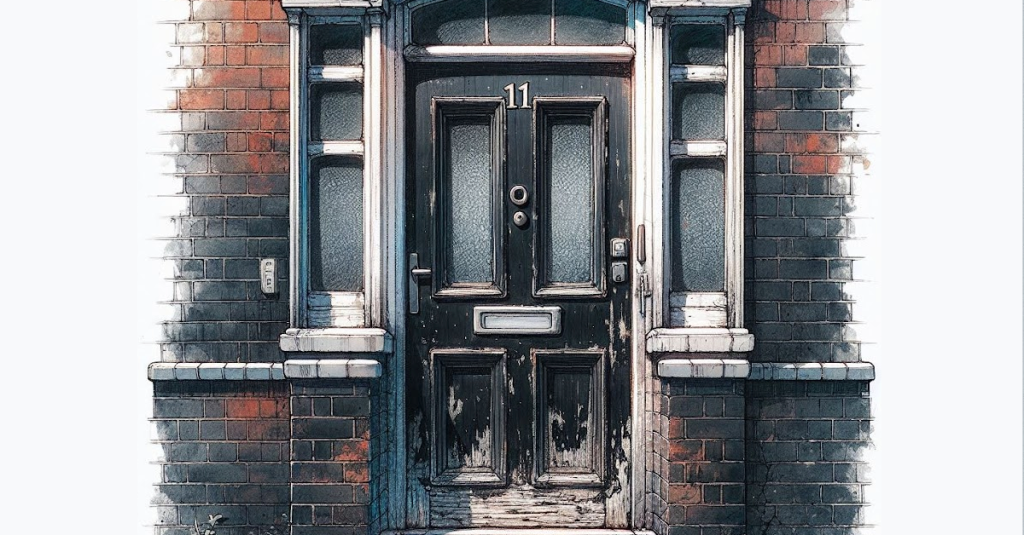

Oh, for Flux Sake
Contrary to how it may appear, I’ve desperately wanted to like Flux. The scope and ambition behind such a series is one that’s hard not to admire. Opening with a series-ending cliffhanger, opting to tell a story over a single canvas stretching across time & space, not to mention the promise of unveiling an enigmatic chapter of the Doctor’s (Jodie Whittaker’s) life predating the shows pilot episode leaves us with plenty to get excited about. Well, it turns out, all that giddiness was for pretty much nothing. Flux opened with a chapter saturated with mystery and unresolved plot points, only for it to end in much the same way. After six-hours of puzzles and enigmas, I’m perhaps more confused following the closing credits of The Vanquishers than I was during the opening titles of The Halloween Apocalypse.
Whereas I’m not the sort of person who expects answers to every plot point or question presented in a given story, when a serialisation has been set up as a mystery intended to be solved, I expect at least some part of that puzzle to be comprehensible by the time said serial has ended. Flux doesn’t seem willing to offer us any kind of satisfactory resolution to the chaos it established on October 31st. Universe-hopping mayhem kicked off for six weeks, only for such disarray to be resolved the moment the Doctor threw a world-eating dude in front of it. All those plots points, characters and questions pelted at our screens, and for what? So the Doctor could undo it all with a dude who purchased his face wear from Wish.com? What a waste of potential.
Chapter six spends much of its runtime having its varying characters standing around, explaining convoluted plot points while refusing to actually shed any light on their significance, purpose or place within the sprawling epic show runner Chris Chibnall has attempted to manufacture. Who are the Ravagers exactly? What’s that world-eating passenger all about? What’s supposed to be going on over at the planet Time? Was Joseph Williamson and his peculiar time-tunnels only implemented so Chibnall could use it to exile the Grand Serpent? Was the Flux really just a bomb engineered by the Doctor’s evil stepmom? Was there much purpose behind Yaz (Mandip Gill), Dan (John Bishop) and Jericho (Kevin McNally) trotting the globe for half a decade in search of a prophesy? What on earth did the Doctor do to Karvanista (Craige Els) that made him loathe her with such passion? Is there seriously going to be no answer to why so much of the Doctor’s past has been concealed from her? And are we never going to learn what that alien alarm system kicking off in human Azure’s garage was all about? If we are going to get answers to any of these questions, it would appear that here certainly isn’t going to be the place.
There’s a scene at the end of all this where the Doctor promises to no longer keep secrets from Yaz. This is framed as though it’s some sort of significant turning point for our hero; the moment in which she’s learned to open up and no longer keep secrets from her friends. The problem is, Yaz is distracted by Dan, resulting in the Doctor telling her absolutely nothing. This means the Doctor’s promise to be more open – both to her companion, and the audience she’s unaware of – isn’t fulfilled. But even if it was, is this really all that can be taken away from the last six-weeks of this series? Are you honestly saying that after everything both the characters and audience have been through, the only significant shift that we can close this story on is the Doctor is now a bit more willing to tell her closest friends secrets, provided no one wanders off in the midst of a conversation? Give me a break!
Then there’s the fact that the Doctor just decides she doesn’t want to find out about her past. You could argue that her decision not to pursue the truth by opening the memory suppressing fob-watch is growth on her part; a discovery that she fears may result in her loosing a vital part of what makes her the Doctor. This is actually a genuinely terrific idea. Except it’s one that hasn’t been setup as a concern of the Doctor’s during any stage within this series. It’s not as though she’s learned that she did anything particularly monstrous that may compromise the development she’s been through during the past several millennia. Even though we learn here that she managed to break Karvanista’s heart in the past, it’s never alluded to that she was an evil person during her time working for the Division. If anything, the clues we have been given imply she was just as much as a hero before she was banished by the Division. So why chose not to open the fob watch and reclaim the very memories she’s spend the past several months searching the universe for? We’ve had setups to revelations that have not been paid off in the past of course (Steven Moffat pulled a similar stunt during his Name of the Doctor arc back in 2012), however this doesn’t give the same mistake a free pass this time around. If you’re going to have the Doctor reject the very thing she’s been looking for, it needs at least a little more setup before she decides to dump the fob watch in the bowels of the Tardis.
Flux goes out of its way to build intrigue and riddles throughout the entirety of its serialisation, only for it to refuse to give us much clarification on any of the mysteries it’s been teasing us about. The serial has spent six weeks gliding toward a revelation, only for it to do a u-turn at the last minute. It’s a six-hour teaser with no revelations. It’s an unjustified waste of time that feels surprisingly pointless for something as ambitious as it is. The Vanquishers is the final building block to such an argument; a finality to the fear that all of this has been for very little.
Squandered Companions
Over the past couple of episodes, we’ve seen Yaz, Dan and Professor Jericho potter across early 20th century earth. During their travels, they’ve defaced the Great Wall of China, tussled with agents supposedly working for the Grand Serpent, stumbled upon Joseph Williamson’s Narnia-like caves and collected puzzles that hint toward a date in which the world will end. It’s no exaggeration on my part to declare that none of their actions lead to anything significant
First, let’s take a peek at the whole Joseph Williamson (Steve Oram) and his magic tunnels. Williamson and his mysterious digging work were indeed true occurrences from actual history. After his wife died, Williamson proceeded to use his fortunes to carve out the underpasses beneath the city of Liverpool. The reasons behind his motives are still unclear to this very day. Speculation suggests he was a religious extremist fixated upon the notion of an impending Armageddon. Others have theorised he was mourning the loss of his wife, leading him to pursue a peculiar project that would preoccupy him until his death. Like a lot of Chibnall’s historical ideas, the decision to take the true story of Williamson and incorporate such a peculiar phenomena into the world of Doctor Who is an outstanding idea that’s completely wasted. Here is a story containing endless potential, only for it to be squandered. Flux, for the most part, has done a good job of building suspense around this particular plot point, slipping back to it regularly throughout the series in order to frame it as one of the most prominent pieces to the serial’s narrative jigsaw. It transpires, however, that it’s only here so Chibnall can wrap up the Grand Serpent’s story prior to the end credits, demobilise a gang of Sontarans and insert Kate Stewart into the plot before it’s time to wrap it all up.
As for the Grand Serpent’s agents that were stalking Yaz and the gang, we get absolutely no mention of them in this episode whatsoever. Their presence last week alongside the Serpent’s seemingly-solo mission to infiltrate Unit hinted at audiences getting a bigger picture of the tyrant’s operation this time around. We saw in Once, Upon Time that the Serpent was indeed operating a large organisation somewhere out in the depths of deep space, which is why it was all the more peculiar to see him working on his todd during Survivors of the Flux. While it was revealed he was in bed with the Sontrarans, his solo efforts topped off with a couple of Serpent tattoo-wearing baddies suggested a bigger operation from his end was set to be revealed. Having the companions fighting the fight from the trenches – so to speak – offered up the perfect opportunity for the Doctor’s friends to discover a bigger picture that would help the Doctor save the day from a threat operating underneath her nose. Except we get none of that. Instead, the Grand Serpent is shown to be working completely alone this week. His agents don’t even get so much as a mention.
Then there’s the end of the world situation from last week. None of that comes back to play a part in the final resolution of this story. Even when the Doctor finally slips back into the mix, Yaz, Dan and Jericho don’t depart any information regarding Armageddon to her. Instead, she manages to persuade a chocolate-loving Sontaran to return Claire (Annabel Scholey) and Jericho to help locate coordinates for the final Flux event reaching Earth. If you’re going to send companions on a trek that eats into years of their lives, at least have them come back with something meaningful to resolve the main plot with. Even as messy and lacklustre as The Last of the Timelords final was back in 2007, at least Martha’s hellish holiday across apocalyptic earth contributed to the Master’s (John Simm’s) fall at the end of that story.
As has been the case throughout much of this series, the companions’ adventures over the past several weeks have mainly served to get them out of the way for a bit. They aren’t crucial to the plot, and the same story could be told without having them in it at all. It’s as if the Doctor has been sending them on pointless errands just so she can get them out of the picture while she tries to figure out what’s going on. While there is perhaps a reading which suggests the Doctor is deliberately doing this so she can find out about her past in secret, the fact that Yaz and Dan are continuously side-lined throughout the entire story still makes them feel meaningless to the wider show. They aren’t detrimental components to the overall narrative, but inconveniences that need pushing out of the way at every opportunity. This is a fundamental misunderstanding of what a companion’s role is within the context of Doctor Who. They are equals to the Doctor, people who learn to rise up, become their best selves and guide the Doctor in areas they’re incapable of navigating on their own. While companions of past eras have helped the Doctor to become a better versions of themselves, during the Chibnall era, they’re often depicted as minor annoyances that the Doctor must keep busy with meaningless tasks for the most part.
An Impossible Alliance
Bringing the Sontarans back for the sixth chapter helps to further cement them into the foundations of Flux’s narrative. I complained during my review of episode two that their inclusion felt out of place compared to the direction things were headed in during the opening story. While War of the Sontarans still sticks out by comparison to everything else, feeding them back into the plot certainly helps to frame them as key players within series 13. There are even some remarkable ideas in here too. For one, I absolutely love Chibnall’s decision to have the Sontarans lure the Daleks and Cybermen to their destruction, just so they can score some points in the game of war they’re forever playing. Pulling a stunt like this further proves Chibnall’s understanding of these enemies. They are the monster equivalent of Donal Trump; pathetic losers who’s drive to be feared and perceived as powerful motivate them to commit whatever atrocities help to cement their images. Dangerous clowns that’ll do anything to emphasize the dangerous part of that description.
Unfortunately, like much of Chibnall’s grand ideas, the concept is largely thrown to the wayside, used instead as a brief sequence that doesn’t really go anywhere. They trick the Daleks and Cybermen, only for the Doctor to have them all wiped out within minutes. There’s a much more interesting story to be told here, one in which the Sontarans gradually weave their way into the Cybermen and Dalek empires as they plan to double cross them the moment an opportunity arises. The problem here is we’ve so many plot strands bouncing all over the shop, there’s no room for this sort of idea to develop and take on a life of its own. It happens, for a minute, then it’s over.
Moreover, while we’re discussing the grand alliance – if that’s how it’s best to be described – the Doctor’s decision to “outsmart” the Sontorans by having them also die alongside the Daleks and Cybermen is an absolute moral mishmash of a conclusion. The Doctor is the sort of character who would try to warn even the most abhorrent of foes if they were walking into the jaws of destruction. There’s little doubt in my mind that she’d take it upon herself to warn the Daleks and Cybermen of the Sontaran’s plan, trying her darndest to have them try to recognise that the Flux is a far bigger threat to all of reality than their games of power snatching. Which is why for the Doctor to happily support both the genocide of all her foes as well as serving up the Sontarans to that same fate is the sort of moral decision she would not reach. As much as I hate to sound like your typical “not my Doctor” crowd, having her respond to the situation at hand in this manner acts as a fundamental misunderstanding of her character as a whole. The Doctor is a character who works to bring out the best in people, to help civilisations and individuals aspire to be the greatest versions of themselves. This very point was hammered home during the previous episode, and it’s a quality she extends even to those who she detests. She’s forever offering out her hand to the Daleks, the Master, and any foe who’s main goal in life appears to burn everything within their vicinity.
The sort of moral vagueness seen on display here has cropped up time and again during recent years. We saw it in Keblam!, when the thirteenth Doctor found herself expressing empathy toward space Amazon; there was the time in The Battle of Ranskoor Av Kolos where she concluded that locking up Tzim-Sha in a statis prison for the rest of eternity was somehow a compassionate punishment for his actions; and how can anyone forget the jaw dropping moment in Spyfall: Part 2 in which the Doctor literally offered up Sacha Dhawan’s Master to the Nazis. None of these moments are ever portrayed to reveal a sadistic side to the Doctor, nor are they intended to change the direction or our understanding of the Doctor’s moral compass. They are plot conveniences. Having the Doctor wipe out every last Sontaran, Dalek and Cyberman isn’t framed as some sort of pivotal shift in the Doctor’s nature, it’s done so the episode can wrap itself up in time for the final scene.
Shenanigans with Azure and Swarm
Right, so forgive me for coming across like a total idiot, but what’s the deal with Azure and Swarm? I understand they played a significant part in the Doctor’s past. I get that Azure was punished by being made to think she was human. I’m aware they have some kind of fetish for destroying things and rebuilding them on repeat. I also kind of get that they must disintegrate people to teleport (I think?). What I don’t get, however, is their relevance to the whole Flux situation. They aren’t working with the Sontarans, they don’t appear to have had any involvement in the engineering of the Flux event, and they are not members of Division. They just seem to be out to get back at the Doctor for defeating them during her pre-Hartnell, renegade days.
This plot would be fine in a standard series of Doctor Who. Slapping them on top of a serialised story intended to be about one event, however, feels a touch jarring. Much like the Sontarans in episode two, we have a situation here that just feels as though it’s running awkwardly in parallel with the main action. Which is particularly weird when they have been featured primarily in the arc-heavy episodes. The fact they’ve been framed as the primary villains whilst simultaneously having very little to do is an odd one.
This is made evermore perplexing in this episode, when they are forced to the front and centre of the narrative. Everything concerning Division and Tecteun are cast aside, bringing them into central focus, all while somehow having them do very little in terms of progressing the plot. They rock up, slaughter the Doctor’s adopted mother, then proceed to tease her about her hidden past for a bit before getting annihilated by a physical manifestation of time. We learn nothing about what exactly it is they want, other than to indulge themselves in watching reality die over and over again. Nor do we learn anything significant about their past relationship with the Doctor. Flux sets these villains up as having a rivalry with the Doctor similar to that of the Master, yet all we’ve really seen to back up this claim is one face-off that occurred during a flashback lacking in context.
There’s a strangeness to their place within Flux that doesn’t quite add up. Their introduction and occupation of the Flux-focused sequences shown at the early part of the series hinted at them functioning as one of series 13’s key players. Then, as things progressed, they slowly took a back seat. It’s as though the show has little idea on what their purpose is, nor can it figure out how to fit them into any scenes or episodes in a way that fees natural or fitting. I loved how they were introduced; full of bravado and menace, happy to slay any poor soul who was unfortunate enough to stumble in their way. By the time we were at episode six, they just felt like uninvited party guests who just kept trying to start up awkward conversation with the other attendees.
Final Verdict
Unfortunately, the final installation of Flux is far from a satisfactory conclusion to a story that’s struggled to function for much of its run. There’s some great ideas in here, and the ambition established back in its opening episode still remains to a degree. Unfortunately, a lot of this just feels directionless, messy and completely void of any answers to a plot built primarily upon mystery. The characters laid out throughout the story are also done a disservice. The companions have been sent on wild goose chases with no resolutions to their outlandishly long tasks, whereas the villains are forced to potter about the place before being killed off by seemingly random occurrences at the last second. While I admire the intention and drive to tell Doctor Who’s biggest story to date, Flux has failed to deliver on any of the grandiose promises it made during its opening episode
There is a chance a lot of the questions and mystery this episode failed to deliver upon will be addressed during Chibnall’s final stretch of episodes in 2022. As far as series finals go, however, this is unsatisfactory, disjointed and disappointing.
Afterthoughts
- Diane has become unusually talented when it comes to understanding outlandish alien concepts. Apparently, her time wondering around inside Passenger has allowed her to become even more intelligent than the Doctor herself. She manages to come up with the solution to ending Flux’s reign of destruction, which is to have Passenger stand in front of the phenomenon and devour the whole thing. Firstly, why would being trapped inside an alien world for a short period of time allow her to figure out how to defeated something she’s never seen before? Secondly, what is the deal with Passenger exactly? I get he’s a creature with a dimension within his biology, but who’s he working for? He seemed to be buddying up with Swarm and Azure for a hefty period of time. Now he’s happy to do the Doctor’s bidding too? For a character that’s been pottering about randomly for much of this series, he still somehow manages to feel as though he’s been plucked out of thin air for the final resolution.
- So, it’s safe to say that Passenger managed to stop the Flux in its tracks. Fine, I’ll buy it, but what about the universe? Isn’t it in absolute tatters now? There’s no mention that Passenger devouring the phenomena put everything back to normal. I hope to the skies they address and resolve this in the three following specials, otherwise this whole series will feel even more worthless and unfinished than it already does.
- I’m astonished that we still know next to nothing about the Doctor’s hidden past. The purpose of introducing a collection of forgotten regenerations prior to the 14 versions we’ve already seen continues to feel utterly meaningless. I imagine it’s going to come up again in the final episode. Still, there’s an awful lot to tie up in the three remaining hours of the Chibnall era. Please make this Timeless Child hullabaloo relevant before you clock out Chris.
- Time’s warning to the Doctor about being aware of the forces that mass against her and their master pretty much confirms Sacha Dhawan will be returning before the end of Whittaker’s run. I’m quite the fan of his portrayal, so this is good news.
- Though the episode quite rightly frames Jericho’s death as a tragic loss, I’m astonished that Dan and Yaz don’t do so much as express an iota of grief after his demise. They’ve just spent years of their life living with this guy, yet when he’s killed, they don’t even do so much as mention his name again. Either this is more evidence of rushed writing, or the Doctor’s current companions are heartless monsters who don’t give two hoots about anyone in their lives.
- Why does Diane reject Dan’s invitation to go out for a drink? She seems to think he was lying about being kidnapped by a dog alien. But she knows everything he’s saying is true, so why on earth is she pretending not to? The answer to this question is so Chibnall can get Dan to join the Doctor on her travels for a bit longer, but this reason doesn’t detract from the fact that such a response makes absolutely no sense within the fictional world it’s taking place within.









5 responses to “‘Wibbly Wobbly, Story Wory’ – Doctor Who Flux Chapter Six: The Vanquishers”
Great review! You eloquently covered my own thoughts and feelings on the finale. I might have an answer for your question about the alarm in human Azure’s garage. I think her partner was also her jailer (and Division agent), and the alarm was to warn him Swarm had escaped but he decided to ignore it and hope he could live out his life with the mind-wiped Azure in secret. Obviously that didn’t pan out. I’m guessing it’s a similar situation to the Fugitive Doctor and her own mind wiped identity. Though that is all speculation on my part!
LikeLiked by 1 person
That’s a brilliant point! I actually think you’re bang on correct there. I hadn’t considered the alarm to be intended as a warning for her husband, however now that you mention it, it makes an awful lot of sense. As you rightly point out too, this mirrors the Fugitive Doctor’s psudo partner from Prisoner of the Judoon.
LikeLiked by 1 person
Yeah, it isn’t overly clear and they never once clarify her situation. Chibnall seems to struggle with either over-explaining or under-explaining plot points, or worse, dismissing logic or explanations to force a plot through.
LikeLiked by 1 person
I quite enjoyed the storyline.
LikeLiked by 1 person
I’m really glad you’ve been enjoying the series. I was a big fan of episode 4. That was perhaps my favourite episode in a long while. I really hope Maxine Alderton returns to write for future episodes in the show.
LikeLike